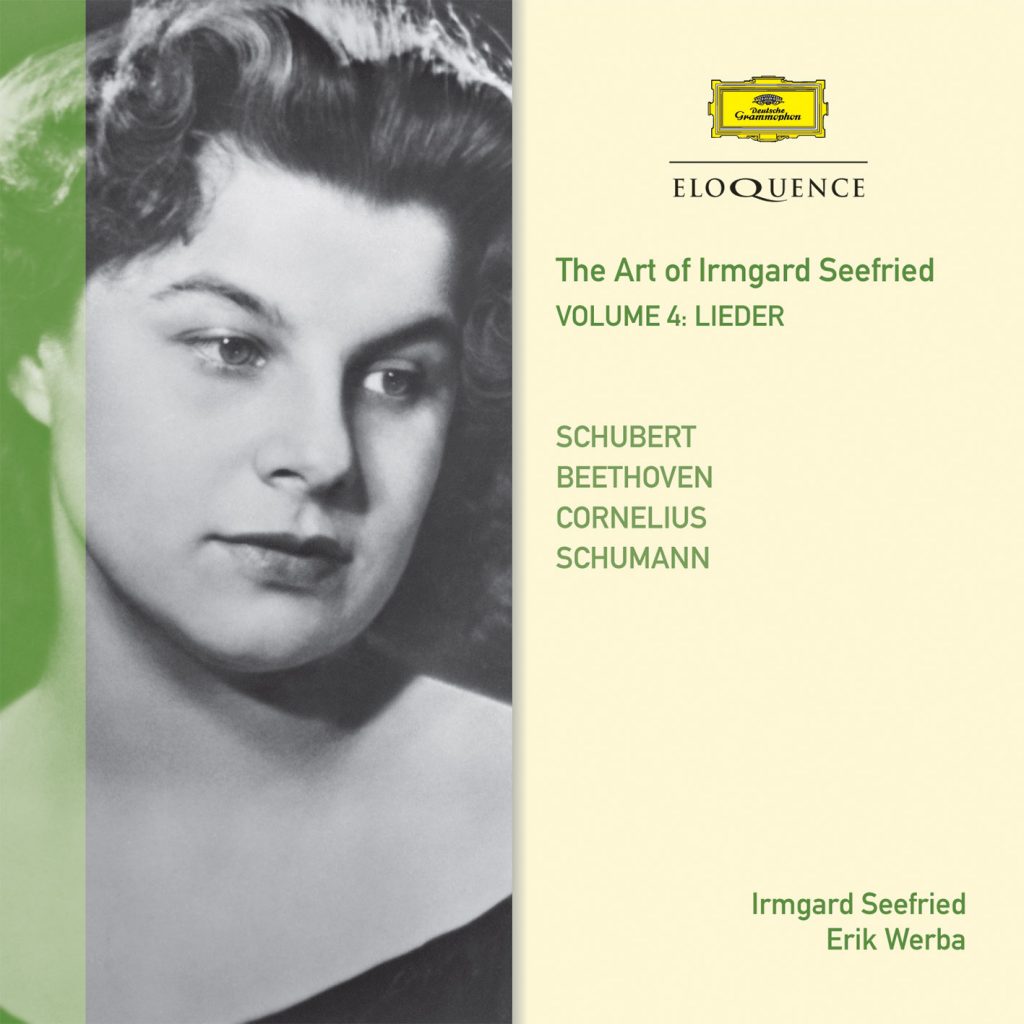‘If I were condemned to hear only one voice for the remainder of my life I think it might well be hers. If I wanted to be charmed, to laugh or cry I would find her the perfect companion. In her singing … we hear someone whose every utterance bespeaks natural sincerity and truthful feeling’
ALAN BLYTH on IRMGARD SEEFRIED (Gramophone)
After Irmgard Seefried’s death in 1988, her contemporary Elisabeth Schwarzkopf – never one to dish out compliments lightly – commented: ‘All of us envied her, because what we had to achieve laboriously worked for her so naturally and as a matter of course, because she knew how to sing from the heart’.
Freshness, spontaneity, natural warmth of feeling, allied to a voice of gleaming beauty and a delightful stage presence: these were the hallmarks of a much-loved soprano who for three decades charmed and moved audiences in the theatre and concert hall, her face as expressive as her voice. As John Steane memorably put it in Gramophone, ‘it was as though she wore her own spotlight’.
Born in the Swabian town of Köngetried in 1919, Seefried was ‘discovered’, aged twenty, by Herbert von Karajan in Aachen, where she made her operatic debut as the Priestess in ‘Aida’. In 1943 she sang Eva in ‘Die Meistersinger’ for the Wiener Staatsoper, initiating an association that lasted until 1976. It was in Strauss and Mozart that Seefried was most admired.
Issued over eleven single-disc volumes, Deutsche Grammophon/Eloquence pays tribute to Irmgard Seefried, bringing back to circulation several recordings that have never previously been issued on CD. The music ranges through opera and oratorio, with an especially generous offering of art song from a range of composers, including Schubert, Schumann, Wolf, Hindemith and Egk. The notes for the series have been written by that leading connoisseur of the voice, Richard Wigmore.
Seefried was no less delightful as a recitalist than she was an opera singer, as can be heard on these recordings of Schubert, Schumann and Cornelius made with Erik Werba, her pianist of choice during the 1950s and ‘60s. In Schubert, her naturalness was an invaluable asset: say, in her tender shaping of the exquisite bel canto melody of ‘Ave Maria’ (1825), Ellen’s prayer to the Virgin from Walter Scott’s The Lady of the Lake, or the charm, without winsomeness, she brings to Goethe’s wryly insouciant tale of blighted innocence, ‘Heidenröslein’.
Her gift of candid simplicity is enchantingly heard in Peter Cornelius’ artless ‘Weihnachtslieder’. Any singer of ‘Frauenliebe und-leben’ must avoid mawkishness and convey a journey from dazed innocence through incredulity, excitement and joy in motherhood, to numbness in bereavement. Seefried’s distinctive timbre, combining the freshness of youth with a glowing warmth, gives her a head start. Beyond this, she experiences the cycle so vividly that for its duration, hers seems the only possible way. Here, as in the ‘Gedichte der Maria Stuart’, we have singing of passionate immediacy and eloquently exploiting the hints of mezzo depth within her luminous soprano.
FRANZ SCHUBERT
Ave Maria, D.839
Der Vollmond strahlt (from Rosamunde, D.797)
Seligkeit, D.433
Suleika, D.720*
Suleikas zweiter Gesang, D.717*
Heidenröslein, D.257*
Der König in Thule, D.367*
Ganymed, D.544*
Gretchen am Spinnrade, D.118*
LUDWIG VAN BEETHOVEN
Wonne der Wehmut*
PETER CORNELIUS
Weihnachtslieder, Op. 8
ROBERT SCHUMANN
Frauenliebe und -leben, Op. 42
Gedichte der Maria Stuart, Op. 13*
Irmgard Seefried, soprano
Erik Werba, piano
*FIRST RELEASE ON CD
Recording Producers: Dr. Fred Hamel (1–3, 11–16); Hans Ritter (4–10, 17–24); Hans Weber (25–29)
Recording Engineers: Heinrich Keilholz (1–3, 11–16); Heinz Wildhagen (4–10, 17–24); Gerhard Henjes (25–29)
Recording Locations: Mozart-Saal, Konzerthaus, Vienna, Austria, 13 September 1952 (1), 9 January 1952 (2–3), 8 January 1952 (11–16); Brahms-Saal, Musikverein, Vienna Austria, 7–9 October 1957 (4–10), 3–4 October 1957 (17–24), 5–8 February 1962 (25–29)
‘the quality of the voice, the balance and the piano tone are of amazing fidelity. Interpretatively too, Mme Seefried is at her most penetrating and revealing, scrupulous with words and their meaning, wonderfully subtle at varying the mood in strophic songs, immensely vital in rhythm.’ Gramophone
‘[The Mary Stuart songs] are all sung with conviction’ Gramophone

